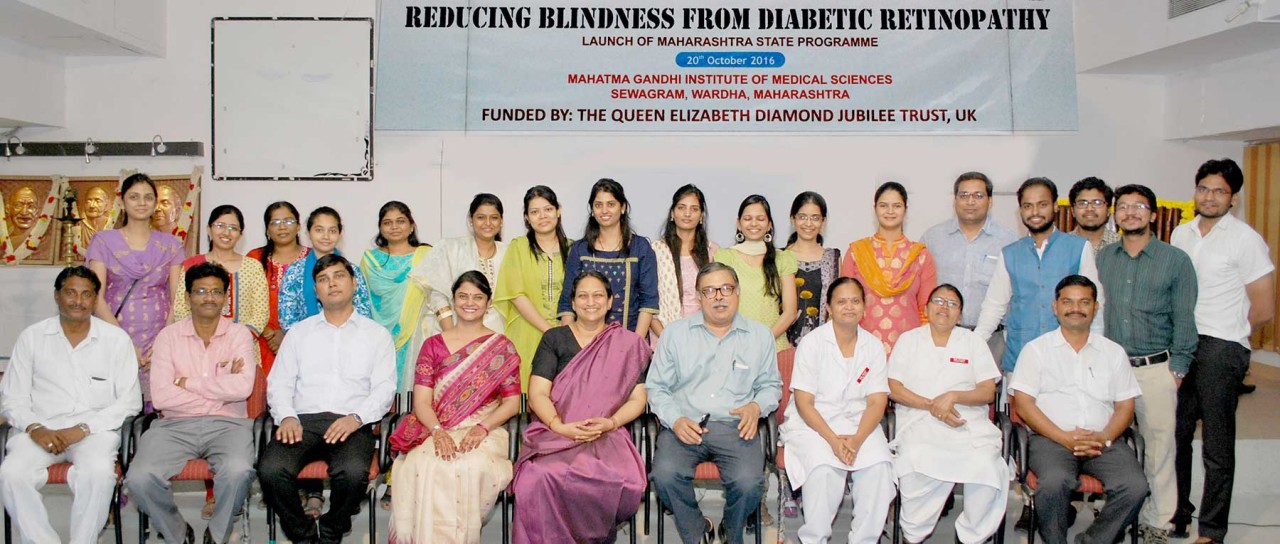On 20 October 2016, MGIMS formally launched Diabetic Care Initiative aimed at preventing blindness from diabetic retinopathy in Wardha district. The program would strengthen and integrate services for prevention, screening and management of diabetic retinopathy into the public health system.
Funded by the Queen Elizabeth Diamond Jubilee Trust and supported by Public Health Foundation of India (PHFI) and London School of Hygiene and Tropical Medicine, MGIMS will play a key role in supporting the department of Public Health, Government of Maharashtra to implement the program this program in Wardha district—one of the 10 pilot districts across the country to achieve the public health objective.
Dr GVS Murthy, Head, Indian Institute of Public Health, Hyderabad was the chief guest of the inaugural function organized at MGIMS. Passionate about prevention of blindness in the community, Dr Murthy has has spent nearly three decades doing path-breaking research that has generated the evidence base for policy formulation and programme implementation of blindness control activities. He began his talk with some numbers that possess the punch of being an eye-opener. “Globally 382 million people lived with diabetes in 2013; the number is likely to grow to 592 million by 2035. Every sixth diabetic in the world is Indian. One of five diabetics has retinopathy and one of 20 has retinopathy severe enough to impair vision.” “The irony is that a little under half the patients with diabetes have a visual loss when they first present to an eye facility and before their retinopathy is detected. To address the tsunami of retinopathy, we need one-stop integrated approach where the diabetic patients could access all disease-associated diagnostics and treatments under one roof. The success will require a national campaign, widespread eye screening to detect undiagnosed patients, and near universal access to treatment,” he added.
Dr Jyoti Jain, Head, department of Medicine at MGIMS spoke on the risk factors that play a key role in diabetic retinopathy. She cited data from two key studies (DCCT and UKPDS) that have looked at duration of diabetes, glycemic control and retinopathy and explained how tight glucose control can reduce damage to retina. “The risk factors for diabetic retinopathy— elevated blood pressure and lipids—need effective management outside the eye care sector as an ophthalmologist is geared toward managing the eye consequences of retinopathy medically or surgically but does not have the wherewithal of achieving good glycemic control, manage hypertension, or lipid levels and monitor dietary modification. There is an urgent need for a paradigm shift wherein screening for diabetic retinopathy should be undertaken at a diabetic service rather than wait for a person with diabetes to come to an eye care facility if vision loss is to be prevented effectively,” she said.
Dr AK Shukla, Head, department of Ophthalmology at MGIMS articulated the objective. He said that the Non-Communicable Disease (NCD) cell in the Wardha district has already identified close to 25 000 patients with diabetes. These patients are offered free oral medications for controlling diabetes. The program aims to screen all diabetic patients registered in NCD clinics in Wardha district hospital, and also in CHCs in Hinganghat, Seloo, Pulgaon and Arvi. To do so, the Ophthalmic Officers shall work with Ophthalmologists to image retina by fundus cameras—without dilating the pupils. Patients with mild to moderate retinopathy shall be seen again after 3 to 6 months; those with sight-threatening retinopathy shall be referred for LASER treatment at Civil Hospital, Wardha or Kasturba Hospital, Sevagram.
Dr Sadhana Tayade—Joint Director Health Services (Non Communicable Diseases) and State Program Officer (National Programme for Control of Blindness)—also spoke on this occasion. She hoped that the joint efforts of the funding agency, the public health department and MGIMS could substantially reduce the number of patients with serious diabetic retinopathy in Wardha district. She expressed her gratitude to the close involvement of the funding agency, the policy makers, the healthcare system and MGIMS and their shared commitment to control this blinding burden.
Earlier, Dr KR Patond, Dean, MGIMS welcomed the guests, explained what MGIMS is all about and hoped that this screening strategy could bring hope to the diabetic patients and make them understand that there is still a light at the end of the tunnel.
Among other, the program was attended by Dr Nivrutti Rathod, Additional Civil Hospital, Wardha and faculty and residents of MGIMS.

